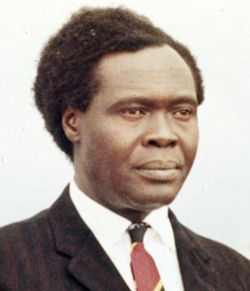President Obote - 1966-1971
 On February 4, 1966, while Prime Minister Obote was away on a trip to the north of the country, an effective "no confidence" vote against Obote was passed by the UPC MPs. This attempt to remove Obote appeared to be organized by UPC Secretary General Grace S.K. Ibingira, closely supported by the UPC leader from Bunyoro, George Magezi, and a number of other southern UPC notables. Only the radical UPC member, John Kakonge, voted against the motion.
On February 4, 1966, while Prime Minister Obote was away on a trip to the north of the country, an effective "no confidence" vote against Obote was passed by the UPC MPs. This attempt to remove Obote appeared to be organized by UPC Secretary General Grace S.K. Ibingira, closely supported by the UPC leader from Bunyoro, George Magezi, and a number of other southern UPC notables. Only the radical UPC member, John Kakonge, voted against the motion.
Because he was faced with a nearly unanimous disavowal by his governing party and national parliament, many people expected Obote to resign. Instead, Obote turned to Idi Amin and the army, and, in effect, carried out a coup d'6tat against his own government in order to stay in power. Obote suspended the constitution, arrested the offending UPC ministers, and assumed control of the state. He forced a new constitution through parliament without a reading and without the necessary quorum. That constitution abolished the federal powers of the kingdoms, most notably the internal autonomy enjoyed by Buganda, and concentrated presidential powers in the prime minister's office. The kabaka objected, and Buganda prepared to wage a legal battle. Baganda leaders rhetorically demanded that Obote's "illegal" government remove itself from Buganda soil.
Buganda, however, once again miscalculated, for Obote was not interested in negotiating. Instead, he sent Idi Amin and loyal troops to attack the kabaka's palace on nearby Mengo Hill. The palace was defended by a small group of bodyguards armed with rifles and shotguns. Amin's troops had heavy weapons but were reluctant to press the attack until Obote became impatient and demanded results. By the time the palace was overrun, the kabaka had taken advantage of a cloudburst to exit over the rear wall. He hailed a passing taxi and was driven off to exile.
After the assault, Obote was reasonably secure from open opposition. The new republican 1967 constitution abolished the kingdoms altogether. Buganda was divided into four districts and ruled through martial law, a forerunner of the military domination over the civilian population that all of Uganda would experience after 1971. Obote's success in the face of adversity reclaimed for him the support of most members of the UPC, which then became the only legal political party. The original independence election of 1962, therefore, was the last one held in Uganda until December 1980.
On the homefront, Obote issued the "Common Man's Charter," echoed the call for African Socialism by Tanzanian president Julius Nyerere, and proclaimed a "move to the left" to signal new efforts to consolidate power. His critics noted, however, that he placed most control over economic nationalization in the hands of an Asian millionaire who was also a financial backer of the UPC.
Obote created a system of secret police, the General Service Unit (GSU). Headed by a relative, Akena Adoko, the GSU reported on suspected subversives. The Special Force Units of paramilitary police, heavily recruited from Obote's own region and ethnic group, supplemented the security forces within the army and police.
Although Buganda had been defeated and occupied by the military, Obote was still concerned about security there. His concerns were well founded; in December 1969, he was wounded in an assassination attempt and narrowly escaped more serious injury when a grenade thrown near him failed to explode. He had retained power by relying on Idi Amin and the army, but it was not clear that he could continue to count on their loyalty.
Obote appeared particularly uncertain of the army after Amin's sole rival among senior army officers, Brigadier Acap Okoya, was murdered early in 1970. (Amin later promoted the man rumored to have recruited Okoya's killers.) A second attempt was made on Obote's life when his motorcade was ambushed later that year, but the vice president's car was mistakenly riddled with bullets. Obote began to recruit more Acholi and Langi troops, and he accelerated their promotions to counter the large numbers of soldiers from Amin's home, which was then known as West Nile District. Obote also enlarged the paramilitary Special Force Units as a counterweight to the army.
Amin, who at times inspected his troops wearing an outsized sport shirt with Obote's face across the front and back, protested his loyalty. But in October 1970, Amin was placed under temporary house arrest while investigators looked into his army expenditures, reportedly several million dollars over budget. Another charge against Amin was that he had continued to aid southern Sudan's Anya Nya rebels in opposing the regime ofJafaar Numayri even after Obote had shifted his support away from the Anya Nya to Numayri. This foreign policy shift provoked an outcry from Israel, which had been supplying the Anya Nya rebels. Amin was dose friends with several Israeli military advisers who were in Uganda to help train the army, and their eventual role in Amin's efforts to oust Obote remained the subject of continuing controversy.
|
NEWSLETTER
|
| Join the GlobalSecurity.org mailing list |
|
|
|

